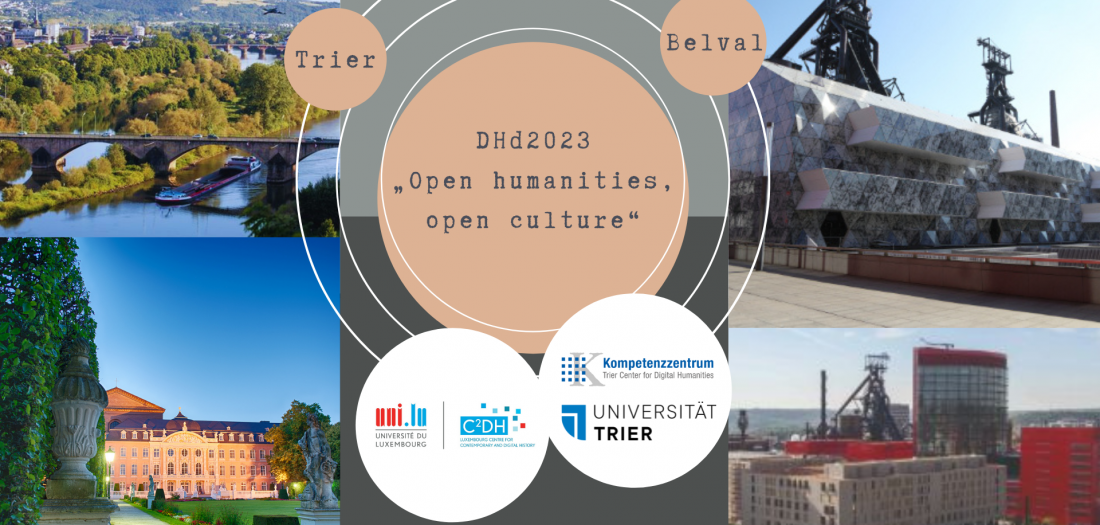DHd2023: „Open Humanities, Open Culture“
The Universities of Trier and Luxembourg host the annual conference on digital humanities in the German-speaking world
11.03.2022 | General, Press Releases

Image reference: © Trier University and University of Luxembourg, from left to right: Trier View of the Moselle River, Trier View of the “Kurfürstliches Palais”, Learning Center Library Belval, Belval Campus
Digitally view the splendor of art-historical ceiling paintings or medieval book collections, discover and examine another detail behind the surface of a work of art. Explore the textual genesis of novels, recognizing from the author's narrative style how a subject is thought about. Performing data analyses on text corpora of the 19th century, telling and researching history digitally – such and similar topics belong to the humanities field of work of Digital Humanities (DH).
Across borders
From March 13th to 17th, 2023, two universities in the Greater Region, Trier and Luxembourg, will co-host DHd2023, the largest professional conference for digital humanities. The topic “Open Humanities, Open Culture” will play a discursive-theoretical role in workshops, lectures, posters and panels, as well as being a practice-guiding principle. The conference is aimed at (digital) humanities scholars, computer scientists and IT specialists, employees of libraries, archives or other knowledge institutions, as well as interested students from Germany and abroad.
The conference has been held annually since 2014. Christof Schöch (Professor for Digital Humanities at the University of Trier and Co-Director of the Trier Center for Digital Humanities, TCDH) and Prof. Dr. Andreas Fickers (Professor for Contemporary and Digital History and Director of the Center for Contemporary and Digital History, C²DH) both spokespersons for the local organization team of DHd2023 explain: “We are delighted that the researchers of the Greater Region have been awarded the contract and may host researchers of the Digital Humanities. We are pleased to welcome them to a region where European partnership is an integral part of everyday life. The great interest in DHd2022 in Potsdam with 1000 participants as well as the determined further development of the German-speaking DH association underline the great potential of this research field: the humanities are a dynamic, innovative research field.”
Open Science
The conference motto “Open Humanities, Open Culture” is intended to make an essential aspect of the DH's self-image visible and explicit. "Open Humanities" ties in with the established and very broad concept of “Open Science”. Prof. Dr. Christof Schöch emphasizes that the conference theme is intended to stimulate a discussion about the special conditions of openness in the humanities, which are not primarily based on measurement or survey data, but on digital representations of cultural artifacts in the broadest sense. This presents its own unique opportunities and challenges (theoretical, practical, and legal).
The openness and freedom that is an ideal of research is particularly evident in the choice of conference locations. Prof. Dr. Andreas Fickers is conducting research with his team at the Center for Contemporary and Digital History at the University of Luxembourg's new campus in Belval. At the site in the south of Luxembourg near Esch-sur-Alzette, which holds the title European Capital of Culture 2022, past and future visibly meet. Next to long-cold brown blast furnaces of the former steel industry are the shiny new facades of the “digital workers”. In this respect, the catchword “Open Culture” also emphasizes the close connection of the humanities to the cultural life of different places and times, which both conference venues stand for with their rich cultural heritage.
Making open exchange between disciplines possible
The spokespersons of DHd2023 point to the challenge that the infrastructural and technical foundations of digitization have for the humanities. Teachers as well as students, employees of libraries, archives and knowledge institutions have acquired new digital competencies; due to the pandemic, they have had to accelerate this acquisition process. This “digital literacy” cannot be acquired purely theoretically, but must be learned through playful and critical interaction. In this sense, “Open Humanities” also means that an open exchange between the humanities and the sciences (especially information and data science) is necessary in order to creatively exploit the potential of digital research infrastructures, data and tools.
Contact:
Prof. Dr. Christof Schöch, Professor for Digital Humanities and Co-Director of the Trier Center for Digital Humanities (TCDH), University of Trier
Prof. Dr. Andreas Fickers, Professor for Contemporary and Digital History and Director of the Center for Contemporary and Digital History (C²DH), University of Luxembourg

